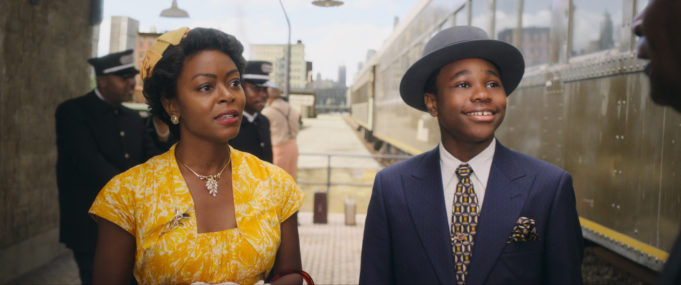Something I’ve noticed in this job: When actors whom I’ve never seen or heard of deliver a great film performance, they’re more likely to be Black. Sure, sometimes white actors come out of nowhere and floor me, but because their Black counterparts receive fewer opportunities, they’re more likely to be unknown to me before they do something great. (Cases in point: Daniel Kaluuya in Get Out, KiKi Layne in If Beale Street Could Talk, Cynthia Erivo in Widows, Jonathan Majors in The Last Black Man in San Francisco, Joshua Boone in A Jazzman’s Blues.)
I’ve never seen TV’s Paradise Lost or The Haves and Have Nots, so Danielle Deadwyler was new to me when I saw her in Till. Her performance as Emmett Till’s mother is everything for this conscientious-to-a-fault drama about the infamous 1957 lynching of a 13-year-old Chicago boy in Mississippi.
She portrays Mamie Till-Mobley, who sends her son Emmett (Jalyn Hall) down south for the summer to visit his family and see their roots. The happy, clowning kid makes the mistake of wolf-whistling Carolyn Bryant (Haley Bennett) while she’s working behind the counter of a general store in the township of Mony, Miss. Thus, her husband (Sean Michael Weber) and his friend (Eric Whitten) come by the farm in the dead of night where Emmett is staying, and the boy’s uncle and cousins stand by helplessly while Emmett is dragged off. When Emmett’s unrecognizable corpse is fished from the river days later, Mamie insists that the dead body be photographed and shown to the public as testament to what the white people of Mississippi have done.
Director/co-writer Chinonye Chukwu previously made Clemency, and her body of work shows her to be a fundamentally scrupulous filmmaker. The film is preceded by a director’s note stating that she intentionally does not depict the actual violence against Emmett Till to prevent her film from becoming another piece of trauma porn, which I can see the logic of. The move works because her showing of the boy’s face with all features beaten out of it is so skillfully built up to and executed. Hall’s performance, too, explodes with life and helps make Emmett Till into something more than a name in a history book and bring home just what was lost when he was murdered.
I do wish Chukwu had been a bit less careful. Her approach is understandable since the subject is such a fraught episode in African-American history, but her portentousness can be a bit much, as when a young Medgar Evers (Tosin Cole) is introduced as a supporting player who assists Mamie during her stay in Mississippi. One years for the relentless sense of momentum that Ryan Coogler brought to Fruitvale Station, or even the freedom that Tyler Perry treats his fictional work A Jazzman’s Blues with. Those are more potent works about racial injustice than this one.
What keeps the film from turning into a museum piece is the performance by Deadwyler, joyous as she dances with her boy, rending the skies with grief when seeing his body, and alert while navigating the political landscape of a strange state while surrounded by Black leaders who are varying degrees of help. Till’s story is the story of this apolitical Northern housewife who learns painfully that racial injustice is not just a thing that happens below the Mason-Dixon Line. The courage and strength she gathers after suffering through a monstrosity is told through this performance and gives the movie its unity and power.
Till
Starring Danielle Deadwyler and Jalyn Hall. Directed by Chinonye Chukwu. Written by Michael Reilly, Keith Beauchamp, and Chinonye Chukwu. Rated PG-13.












